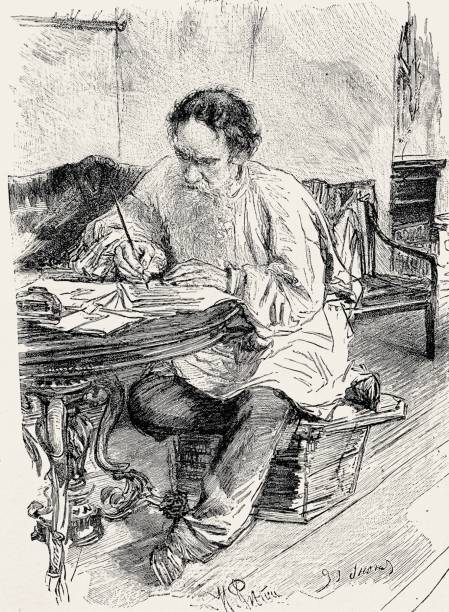Leo Tolstoy Archive
Written: 1888
Source: "Sevastopol," by Leo Tolstoy, translated by Isabel F. Hapgood, Published by Thomas Y. Crowell Co., 13 Astor Place
Transcription/Markup: Andy Carloff
Online Source: RevoltLib.com; 2021

“There is blood on your cloak; have you been having a hand-to-hand fight?” Kalugin asked him.
“Oh, 'tis frightful! Just imagine....”
And Pesth began to relate how he had led his company, how the commander of the company had been killed, how he had spitted a Frenchman, and how, if it had not been for him, the battle would have been lost.
The foundations for this tale, that the company commander had been killed, and that Pesth had killed a Frenchman, were correct; but, in giving the details, the yunker had invented facts and bragged.
He bragged involuntarily, because, during the whole engagement, he had been in a kind of mist, and had forgotten himself to such a degree that everything which happened seemed to him to have happened somewhere, sometime, and with some one, and very naturally he had endeavored to bring out these details in a light which should be favorable to himself. But what had happened in reality was this:—
The battalion to which the yunker had been ordered for the sortie had stood under fire for two hours, near a wall; then the commander of the battalion said something, the company commanders made a move, the battalion got under way, issued forth from behind the breastworks, marched forward a hundred paces, and came to a halt in columns. Pesth had been ordered to take his stand on the right flank of the second company.
The yunker stood his ground, absolutely without knowing where he was, or why he was there, and, with restrained breath, and with a cold chill running down his spine, he had stared stupidly straight ahead into the dark beyond, in the expectation of something terrible. But, since there was no firing in progress, he did not feel so much terrified as he did queer and strange at finding himself outside the fortress, in the open plain. Again the battalion commander ahead said something. Again the officers had conversed in whispers, as they communicated the orders, and the black wall of the first company suddenly disappeared. They had been ordered to lie down. The second company lay down also, and Pesth, in the act, pricked his hand on something sharp. The only man who did not lie down was the commander of the second company. His short form, with the naked sword which he was flourishing, talking incessantly the while, moved about in front of the troop.
“Children! my lads! ... look at me! Don't fire at them, but at them with your bayonets, the dogs! When I shout, Hurrah! follow me close ... the chief thing is to be as close together as possible ... let us show what we are made of! Do not let us cover ourselves with shame—shall we, hey, my children? For our father the Czar!”
“What is our company commander's surname?” Pesth inquired of a yunker, who was lying beside him. “What a brave fellow he is!”
“Yes, he's always that way in a fight ...” answered the yunker. “His name is Lisinkovsky.”
At that moment, a flame flashed up in front of the company. There was a crash, which deafened them all, stones and splinters flew high in the air (fifty seconds, at least, later a stone fell from above and crushed the foot of a soldier). This was a bomb from an elevated platform, and the fact that it fell in the midst of the company proved that the French had caught sight of the column.
“So they are sending bombs!... Just let us get at you, and you shall feel the bayonet of a three-sided Russian, curse you!” shouted the commander of the company, in so loud a tone that the battalion commander was forced to order him to be quiet and not to make so much noise.
After this the first company rose to their feet, and after it the second. They were ordered to fix bayonets, and the battalion advanced. Pesth was so terrified that he absolutely could not recollect whether they advanced far, or whither, or who did what. He walked like a drunken man. But all at once millions of fires flashed from all sides, there was a whistling and a crashing. He shrieked and ran, because they were all shrieking and running. Then he stumbled and fell upon something. It was the company commander (who had been wounded at the head of his men and who, taking the yunker for a Frenchman, seized him by the leg). Then when he had freed his leg, and risen to his feet, some man ran against his back in the dark and almost knocked him down again; another man shouted, “Run him through! what are you staring at!”
Then he seized a gun, and ran the bayonet into something soft. “Ah, Dieu!” exclaimed some one in a terribly piercing voice, and then only did Pesth discover that he had transfixed a Frenchman. The cold sweat started out all over his body. He shook as though in a fever, and flung away the gun. But this lasted only a moment; it immediately occurred to him that he was a hero. He seized the gun again, and, shouting “Hurrah!” with the crowd, he rushed away from the dead Frenchman. After having traversed about twenty paces, he came to the trench. There he found our men and the company commander.
“I have run one man through!” he said to the commander.
“You're a brave fellow, Baron.”